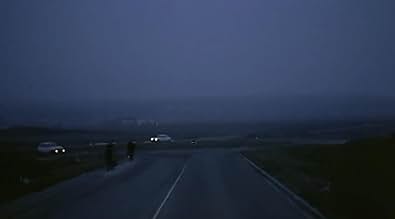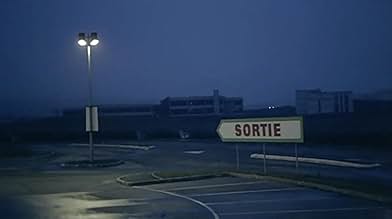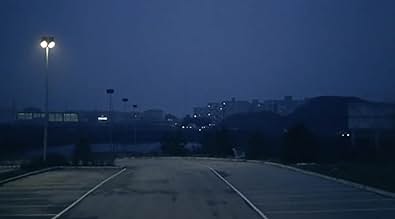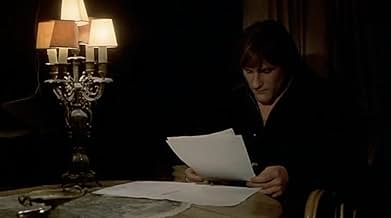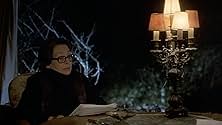Adicionar um enredo no seu idiomaA female writer reads a script to her future performer. A script still in the making, as little by little the images come to life and the characters take shape.A female writer reads a script to her future performer. A script still in the making, as little by little the images come to life and the characters take shape.A female writer reads a script to her future performer. A script still in the making, as little by little the images come to life and the characters take shape.
- Direção
- Roteirista
- Artistas
- Prêmios
- 1 indicação no total
Avaliações em destaque
It divided the critics when it was shown at the Cannes Festival although it obtained the surprising endorsement of Pauline Kael.Duras' cinema usually is light in plot and incident but here she takes her usual style to an extreme of minimalism.In a dark room the woman(Duras) and the man (Depardieu)talk for about eighty minutes. The woman talks about the film which she would have made,a film about a woman who hitches a ride with a truck driver ,coincidentally perhaps a film not unlike the minimalist "Je tu il elle" by another feminist director Chantal Akerman. Spliced between these conversations are shots of a truck driving through endless Parisian suburbs,a landscape which has a certain bleak industrial beauty.It becomes clear that Duras is both the writer/director and the woman who is hitching the ride while Depardieu is both the actor and the truck driver and between the two settings, the interior of the script and the exterior where it would be played out a film,struggling to find expression,is born in the imagination of the receptive viewer.
Marguerite Duras is having a conversation with Gerard Depardieu about a film she intends to shoot, whose script she is holding in her hands. That movie is Le camion. This relaxed conversation alternates with long shots of landscape images shot from the truck window, taking advantage of Beethoven's Diabelli variations to give the viewer something to enjoy.
Marguerite pretends to know what she's talking about and looks up as if telling Gerard what she's thinking, but obviously it's not that at all, because mid-sentence she has to glance at the page she's holding, or shamelessly start reading. Of course, she says each sentence delighting in her creativity as if she were devising the Tractatus Logico-Philosophicus.
The script she is reading is ridiculous, uninteresting, a delirious conversation between a trucker and a hitchhiker woman about the origin and end of the world, about the universe, about the proletariat; but Gerard Depardie is forced to say again and again I see, and put on a face of understanding or athat of someone experiencing an epiphany with each enigmatic outburst from Duras.
The film seems conceived, written and made in a couple of hours. That is not serious because obviously it has cost nothing: neither money nor effort. I guess Gerard Depardieu would participate for free, because he has nothing to do either, not even learn a script, since like Duras, he reads directly from some pages in front of him. I suppose that in those years he would find it a prestigious project.
Pulling on its literary prestige, she always had great names in French cinema acting in her sometimes unbearable films, and it is always interesting to see Jeanne Moreau or Delphine Seyring, even if they do nothing more than wander in front of the camera. When she wants to give her films more packaging, she also hires cinemagraphers like Sacha Vierny.
In Cannes Le camion was a scandal, and Duras seems to have had to endure insults. Terrible, this woman did no harm to anyone filming Le camion: I don't think she needed subsidies to make this film, I don't think anyone was fooled by promoting it as an action film...anyone who entered the cinema could expect what they would find.
We also have to thank her for never shooting that script she had planned: a shooting that, as she herself says, would be fast, cheap, in black and white. To make it clear that none of the images would correspond to that unshot film, what we see is in color.
Definitely not among Duras best.
Marguerite pretends to know what she's talking about and looks up as if telling Gerard what she's thinking, but obviously it's not that at all, because mid-sentence she has to glance at the page she's holding, or shamelessly start reading. Of course, she says each sentence delighting in her creativity as if she were devising the Tractatus Logico-Philosophicus.
The script she is reading is ridiculous, uninteresting, a delirious conversation between a trucker and a hitchhiker woman about the origin and end of the world, about the universe, about the proletariat; but Gerard Depardie is forced to say again and again I see, and put on a face of understanding or athat of someone experiencing an epiphany with each enigmatic outburst from Duras.
The film seems conceived, written and made in a couple of hours. That is not serious because obviously it has cost nothing: neither money nor effort. I guess Gerard Depardieu would participate for free, because he has nothing to do either, not even learn a script, since like Duras, he reads directly from some pages in front of him. I suppose that in those years he would find it a prestigious project.
Pulling on its literary prestige, she always had great names in French cinema acting in her sometimes unbearable films, and it is always interesting to see Jeanne Moreau or Delphine Seyring, even if they do nothing more than wander in front of the camera. When she wants to give her films more packaging, she also hires cinemagraphers like Sacha Vierny.
In Cannes Le camion was a scandal, and Duras seems to have had to endure insults. Terrible, this woman did no harm to anyone filming Le camion: I don't think she needed subsidies to make this film, I don't think anyone was fooled by promoting it as an action film...anyone who entered the cinema could expect what they would find.
We also have to thank her for never shooting that script she had planned: a shooting that, as she herself says, would be fast, cheap, in black and white. To make it clear that none of the images would correspond to that unshot film, what we see is in color.
Definitely not among Duras best.
I know Marguerite Duras is famous, but The Lorry is one of the most boring movies I've ever sat through. I wonder if even her biggest fans enjoyed this one. Perhaps they did, since they got to pretend they were hanging out in her living room while she spitballed her next story idea.
When I tell you that nothing happens in this movie, it's actually true. For eighty minutes, Marguerite sits at a table in her home and talks about a movie she's going to make. Sometimes she reads aloud passages from the script and sometimes she just talks about her vision for what would happen. Sometimes the film cuts to exterior shots of the open road, since her would-be movie is about a hitchhiker in a truck. Sometimes there are long silences. Sometimes her one-person audience, Gérard Depardieu, asks a question. Sometimes he just sits there and turns the page of the script. If you have insomnia and sleeping pills don't work, put this movie on for ten minutes. It worked for me several times.
When I tell you that nothing happens in this movie, it's actually true. For eighty minutes, Marguerite sits at a table in her home and talks about a movie she's going to make. Sometimes she reads aloud passages from the script and sometimes she just talks about her vision for what would happen. Sometimes the film cuts to exterior shots of the open road, since her would-be movie is about a hitchhiker in a truck. Sometimes there are long silences. Sometimes her one-person audience, Gérard Depardieu, asks a question. Sometimes he just sits there and turns the page of the script. If you have insomnia and sleeping pills don't work, put this movie on for ten minutes. It worked for me several times.
The relationship between film and narrative severed-or alternatively reinforced. Duras reads a script to Gerard Depardieu in her house. The script describes the scenario for an imaginary film in which a woman hitches a ride on a truck by the sea and launches into a monologue-with occasional interdictions, responses, questions from the (male) driver-sometimes closing her eyes and launching into song, observing the landscape (apparently inaccurately), hinting at stories, providing vague hints of a family connection (the birth of her daughter's child), a love affair, her disillusionment with the present state of Marxist politics, the complicity of the proletariat's official representatives with those of the power structure they ostensibly seek to overthrow, 'ruin' the only politics. Duras describes this in the conditional tense-this is what she would have said if we had made this film-yet this description is itself scripted, everything under a tight control belying the vagueness, the dissolution, the aimlessness imparted by dialogue and scenario. Depardieu's questions seem, too, to be scripted, his and Duras' eyes fleeting downwards to the pages of script they held even when the dialogue appears spontaneous. They are not the female passenger and the male driver, but of course they cannot not be read as analogues. As in 'Le Navire Night', in which the focus on settings, costumes, the process of make-up, are disconnected from any dramatized acting of the scenarios described, film becomes a record of narration rather than an embodiment of what's narrated; but as one critic points out, perhaps this makes 'Le Camion' more truly a 'narrative film' than any conventional film narrative.
The film cuts between Duras and Depardieu, filmed in one setting at night, in another at dusk; between shots, filmed from a moving vehicle, of the landscape-factories, lorry parks, the edges of towns constituting neither the urban built environment nor the rural; spaces of transport and passage-and shots of the titular blue lorry travelling through it, Beethoven's Diabelli Variations intermittently coming and going as if on the truck's radio. Duras notes in her script that the film could be shot in various different locales-all of them outside the metropolitan centre, through-spaces, neglected spaces, a 'land of migrants'. As such, they destabilise notions of national belonging, of the power relations read into landscape, while suggesting the fate of the economic periphery, that to the side of dominant narratives, in a manner far removed from the conventional representational framings of social realism, cinema verité, and the like. Like the room in which Duras and Depardieu read, the script describes the lorry's cabin as both darkroom and prison, safe house and space of incarceration. "I feel as though you and I, too, are threatened by the same light that they are frightened of; the fear that all of a sudden the lorry's cab, this darkroom, may be flooded by a stream of light, you see...The fear of a catastrophe: political intelligence /understanding." Is that fear the fear of political intelligence, or is its fear political intelligence in itself? What might this catastrophe be, insulated but constantly on the move? Is this even all an extended metaphor for the 'fellow traveller'? The film that would have been-yet which, in its rehearsal, retelling, conjectural description, is a film-is that stand in for the idea of revolution, of a non-derailed, non-betrayed communism that refuses compromises with the established order, in what Duras describes as a bargain between capitalism and socialism, "the infinite delay of any free revolution".
"Several explanations would have been possible".
The film cuts between Duras and Depardieu, filmed in one setting at night, in another at dusk; between shots, filmed from a moving vehicle, of the landscape-factories, lorry parks, the edges of towns constituting neither the urban built environment nor the rural; spaces of transport and passage-and shots of the titular blue lorry travelling through it, Beethoven's Diabelli Variations intermittently coming and going as if on the truck's radio. Duras notes in her script that the film could be shot in various different locales-all of them outside the metropolitan centre, through-spaces, neglected spaces, a 'land of migrants'. As such, they destabilise notions of national belonging, of the power relations read into landscape, while suggesting the fate of the economic periphery, that to the side of dominant narratives, in a manner far removed from the conventional representational framings of social realism, cinema verité, and the like. Like the room in which Duras and Depardieu read, the script describes the lorry's cabin as both darkroom and prison, safe house and space of incarceration. "I feel as though you and I, too, are threatened by the same light that they are frightened of; the fear that all of a sudden the lorry's cab, this darkroom, may be flooded by a stream of light, you see...The fear of a catastrophe: political intelligence /understanding." Is that fear the fear of political intelligence, or is its fear political intelligence in itself? What might this catastrophe be, insulated but constantly on the move? Is this even all an extended metaphor for the 'fellow traveller'? The film that would have been-yet which, in its rehearsal, retelling, conjectural description, is a film-is that stand in for the idea of revolution, of a non-derailed, non-betrayed communism that refuses compromises with the established order, in what Duras describes as a bargain between capitalism and socialism, "the infinite delay of any free revolution".
"Several explanations would have been possible".
Marguerite Duras said, "I approach cinema with the intention to murder it." "Le Camion" is irrefutable evidence of her criminal intent. John Waters called "Le Camion" an example of truly experimental cinema because it is the absolute antithesis of anything remotely commercial. Released the same year as "Saturday Night Fever," it would be a sign of insanity to consider pairing "Le Camion" with it on a double-bill. Duras' film consists of endless shots of a blue truck driving through industrial sectors of the French suburbs, edited with the jaded-looking, chain-smoking director commenting on a script (that is never actually shot) to actor Gerard Depardieu. There is plenty of time to contemplate Duras' bracelets, wristwatch and her home decor, as well as what you might do once you're finally let out of the theater. An interior shot of the truck's upholstered bucket seats actually stuns the audience as if it were a moment of high-intensity drama. Eighty minutes long, the film actually seems much longer; in fact, it seems to take days. Oddly, it held me in a trance-like state for its duration. For his part, Depardieu -- constantly upstaged by the passive-aggressive Ms Duras -- looks bemused and feeds his co-star a lot of questions, which she answers with dismissive grandiosity, all of which is aimless. She talks about the script -- a story of a male truck-driver and an older, female hitchhiker, and their conversations, which are political, humanitarian, philosophical and all complete twaddle -- as if she has all the time in the world, and so do you. There may be something existential intended or it may, as I suspect, all be drivel. In any event, there is no question MD succeeds in strangling the life out of the cinema -- very slowly. Not to be missed, and unlikely you will want to see it twice. As Waters pointed out, introducing the film at Alliance Francaise in New York in February 2006, this film was never released on VHS and is unlikely to show up anytime soon on DVD.
Você sabia?
- CuriosidadesMarguerite Duras's debut as an actress and she also wrote and directed this film.
- ConexõesEdited into Passage des arts: Marguerite Duras, l'écriture et la vie (2021)
- Trilhas sonoras33 Veränderungen über einen Walzer von A. Diabelli op 120
Written by Ludwig van Beethoven
Principais escolhas
Faça login para avaliar e ver a lista de recomendações personalizadas
Detalhes
- Tempo de duração
- 1 h 16 min(76 min)
- Mixagem de som
- Proporção
- 1.66 : 1
Contribua para esta página
Sugerir uma alteração ou adicionar conteúdo ausente

